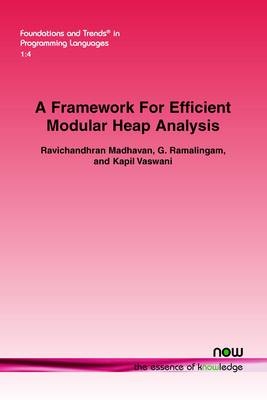
A Framework For Efficient Modular Heap Analysis
Seiten
2015
now publishers Inc (Verlag)
978-1-68083-002-6 (ISBN)
now publishers Inc (Verlag)
978-1-68083-002-6 (ISBN)
Modular heap analysis techniques analyse a program by computing summaries for every procedure in the program that describes its effects on an input heap. This book focuses on modular heap analyses that summarize a procedure's heap effects using a context-independent, shape-graph-like summary that is agnostic to the aliasing in the input heap.
Modular heap analysis techniques analyze a program by computing summaries for every procedure in the program that describes its effects on an input heap, using pre-computed summaries for the called procedures. In A Framework For Efficient Modular Heap Analysis, the focus is on a family of modular heap analyses that summarize a procedure's heap effects using a context-independent, shape-graph-like summary that is agnostic to the aliasing in the input heap. These analyses are very efficient but their complexity and the absence of a theoretical formalization and correctness proofs makes it hard to produce correct extensions and modifications of these algorithms - whether to improve precision or scalability or to compute more information.
This book presents a modular heap analysis framework that generalizes these four analyses. It formalizes this framework as an abstract interpretation and establishes the correctness and termination guarantees. It formalizes the four analyses as instances of the framework. The formalization explains the basic principle behind such modular analyses and simplifies the task of producing extensions and variations of such analyses. It is written with exceptional clarity and is a delightful read for program analysis experts and novices alike.
Modular heap analysis techniques analyze a program by computing summaries for every procedure in the program that describes its effects on an input heap, using pre-computed summaries for the called procedures. In A Framework For Efficient Modular Heap Analysis, the focus is on a family of modular heap analyses that summarize a procedure's heap effects using a context-independent, shape-graph-like summary that is agnostic to the aliasing in the input heap. These analyses are very efficient but their complexity and the absence of a theoretical formalization and correctness proofs makes it hard to produce correct extensions and modifications of these algorithms - whether to improve precision or scalability or to compute more information.
This book presents a modular heap analysis framework that generalizes these four analyses. It formalizes this framework as an abstract interpretation and establishes the correctness and termination guarantees. It formalizes the four analyses as instances of the framework. The formalization explains the basic principle behind such modular analyses and simplifies the task of producing extensions and variations of such analyses. It is written with exceptional clarity and is a delightful read for program analysis experts and novices alike.
1: Introduction 2: An Informal Overview 3: The Language and Concrete Semantics 4: The Analysis Framework 5: Parametric Abstract Semantics 6: Specializations of the Framework 7: Instances of the Framework 8: Experimental Results 9: Related Work and Conclusion. Appendices. References.
| Reihe/Serie | Foundations and Trends® in Programming Languages |
|---|---|
| Verlagsort | Hanover |
| Sprache | englisch |
| Maße | 156 x 234 mm |
| Gewicht | 194 g |
| Themenwelt | Informatik ► Datenbanken ► Data Warehouse / Data Mining |
| ISBN-10 | 1-68083-002-3 / 1680830023 |
| ISBN-13 | 978-1-68083-002-6 / 9781680830026 |
| Zustand | Neuware |
| Haben Sie eine Frage zum Produkt? |
Mehr entdecken
aus dem Bereich
aus dem Bereich
Datenanalyse für Künstliche Intelligenz
Buch | Softcover (2024)
De Gruyter Oldenbourg (Verlag)
CHF 104,90
Auswertung von Daten mit pandas, NumPy und IPython
Buch | Softcover (2023)
O'Reilly (Verlag)
CHF 62,85


